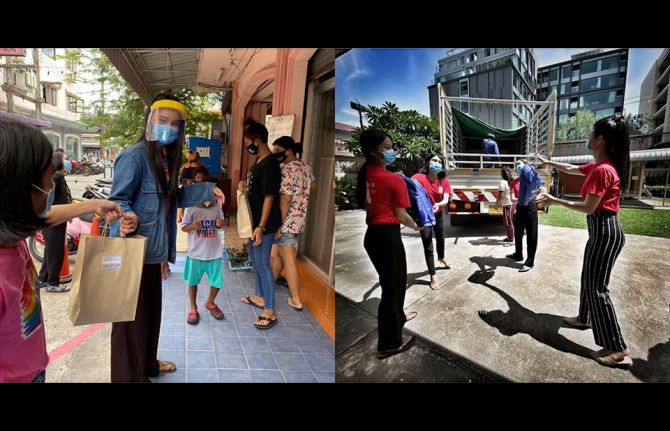

Feature Story
Transgender communities in Asia and the Pacific respond to COVID-19 through activism
30 March 2021
30 March 2021 30 March 2021The global health emergency caused by the COVID-19 pandemic has brought existing inequalities to the forefront, has exposed transgender and gender-diverse communities to a heightened risk of social exclusion, stigma and discrimination, has reduced access to health care and has caused financial insecurity.
“COVID-19 has created an existential threat to many transgender people in Asia and the Pacific. But trans-led organizations and groups have found creative ways to assist their communities, to offer support against social isolation and to support trans and gender-diverse people, especially those unable to work due to COVID-19. We recognize the importance of trans leadership and their response to communities greatly affected by the pandemic,” said Joe Wong, Executive Director of the Asia Pacific Transgender Network (APTN).
When COVID-19 reached India, Maya, a young transgender woman living with HIV volunteering at Basera Samajik Sansthan, a transgender-led community-based organization in Uttar Pradesh, was living in rented accommodation after being rejected by her family. “During the COVID-19 outbreak, my friends and I had to leave our homes because we couldn’t afford the rent,” she said. Basera Samjik Sansthan provided her and her friends with shared accommodation and supplied them with food and medicine. The community-led organization also established a peer support programme to help homeless transgender young people and provide them with hand sanitizer, masks and access to free HIV and COVID-19 testing.
Her testimony is part of a collection of stories published in Dignity amidst COVID-19: Trans Youth Leading The Response, developed by APTN and Youth LEAD, and supported by the UNAIDS Regional Support Team for Asia and the Pacific, to bring visibility to the voices and experiences of transgender and gender-diverse youth leaders and showcase the efforts of transgender-led organizations throughout the region during COVID-19.
“Many transgender people living with HIV were not able to afford transportation to medical centres to receive treatment during the COVID-19 outbreak,” said Della, a young transgender woman living with HIV from Indonesia who works for the Srikandi Sejati Foundation, whose testimony is also collected in the Dignity amidst COVID-19 series. The Srikandi Sejati Foundation established a community support programme that covered transport costs to medical centres to ensure that transgender people could access HIV services. It also implemented local workshops to support and empower transgender women in five districts in Jakarta with knowledge on COVID-19, HIV, mental health and adherence to antiretroviral therapy.
In Thailand, measures taken to curb the spread of COVID-19 and the consequent decline in tourism have forced many entertainment shows and venues to close, leaving many transgender people out of work. “The decline in tourism has heavily affected not only businesses but sources of income for transgender people. Many trans women have returned to rural areas to be with their families due to loss of employment,” said Garfield, a young transgender woman working for the Sisters Foundation, a transgender-led organization in Pattaya that provides a range of HIV services to transgender people, including check-ups for general health, HIV and sexually transmitted infections, hormone therapy and harm reduction. As described in the collection of stories, since the beginning of the pandemic, Garfield and other volunteers have been at the forefront of the COVID-19 relief efforts, distributing food supplies and hygiene products to transgender women.
Basera Samajik Sansthan, the Srikandi Sejati Foundation and the Sisters Foundation are all beneficiaries of the COVID-19 Community Support Fund established by APTN to support transgender people and community-based organizations to ease the burden of the COVID-19 pandemic in the region. APTN provided grants to 22 transgender-led and transgender-inclusive community groups and organizations across 14 countries, enabling them to assist more than 2300 people across Asia and the Pacific. The grant supported various initiatives, including access to essential supplies, food and personal protective equipment, social and mental health relief support, financial assistance and funding support to sustain organizations.
The community-led initiatives and outcomes of the response to COVID-19 are summarized in the Trans Resilience Report—Stories of Hope, Pain, and Survival from the Trans Movement during the COVID-19 Pandemic, developed with financial support from the UNAIDS Regional Support Team for Asia and the Pacific, and in APTN’s multi-week social media campaign.
“On International Transgender Day of Visibility, UNAIDS recognizes the indispensable contributions made by transgender communities in the HIV and COVID-19 response. The leadership and resilience of transgender and gender-diverse communities continues to be an inspiration for our region,” said Eamonn Murphy, Director of the UNAIDS Regional Support Team for Asia and the Pacific. UNAIDS will continue to work with APTN and transgender-led organizations to work towards a region where transgender people and gender-diverse people can thrive as equals.
Our work
Region/country
- Asia and Pacific
- Australia
- Bangladesh
- Bhutan
- Brunei Darussalam
- Cambodia
- China
- Democratic People's Republic of Korea
- Federated States of Micronesia
- Fiji
- India
- Indonesia
- Islamic Republic of Iran
- Japan
- Kiribati
- Lao People's Democratic Republic
- Malaysia
- Maldives
- Marshall Islands
- Mongolia
- Myanmar
- Nauru
- Nepal
- New Zealand
- Pakistan
- Palau
- Papua New Guinea
- Philippines
- Republic of Korea
- Singapore
- Solomon Islands
- Sri Lanka
- Thailand
- Timor-Leste
- Tonga
- Tuvalu
- Vanuatu
- Viet Nam
- Samoa



